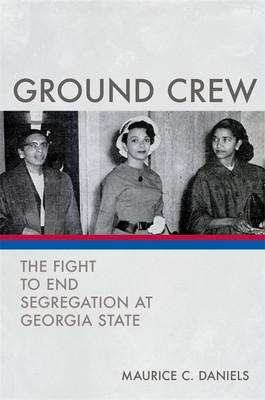
- We will send in 10–14 business days.
- Author: Maurice C Daniels
- Publisher: University of Georgia Press
- ISBN-10: 0820355976
- ISBN-13: 9780820355979
- Format: 15.2 x 22.9 x 1.3 cm, softcover
- Language: English
- SAVE -10% with code: EXTRA
Reviews
Description
The Hunt v. Arnold decision of 1959 against the state of Georgia marked a watershed moment in the fight against segregation in higher education. Though the Supreme Court declared school segregation illegal in its 1954 Brown v. Board of Education decision, Georgia was among many southern states that refused to abide by the Court's ruling. In 1956, the Georgia State College of Business (now Georgia State University) denied admission to nine black applicants. Three of those applicants--lead plaintiff Barbara Pace Hunt, Iris Mae Welch, and Myra Elliott Dinsmore--coordinated with the NAACP and local activists to win a groundbreaking lawsuit against the state of Georgia and its Board of Regents. Hunt v. Arnold became the NAACP's first federal court victory against segregated education in Georgia, establishing key legal precedents for subsequent litigation against racial discrimination in education.
With Ground Crew, Maurice Daniels provides an intimate and detailed account that chronicles a compelling story. Following their litigation against the all-white institution, Hunt, Welch, and Dinsmore confronted hardened resistance and attacks from white supremacists, including inflammatory statements by high-profile political leaders and personal threats from the Ku Klux Klan. Using archival sources, court records, collections of personal papers, news coverage, and oral histories of that era, Daniels explores in depth the plaintiffs' courageous fight to end segregation at Georgia State. In lucid prose, Daniels sheds light on the vital role of community-based activists, local attorneys, and the NAACP in this forgotten but critical piece of the struggle to end segregation.
EXTRA 10 % discount with code: EXTRA
The promotion ends in 17d.10:50:29
The discount code is valid when purchasing from 10 €. Discounts do not stack.
- Author: Maurice C Daniels
- Publisher: University of Georgia Press
- ISBN-10: 0820355976
- ISBN-13: 9780820355979
- Format: 15.2 x 22.9 x 1.3 cm, softcover
- Language: English English
The Hunt v. Arnold decision of 1959 against the state of Georgia marked a watershed moment in the fight against segregation in higher education. Though the Supreme Court declared school segregation illegal in its 1954 Brown v. Board of Education decision, Georgia was among many southern states that refused to abide by the Court's ruling. In 1956, the Georgia State College of Business (now Georgia State University) denied admission to nine black applicants. Three of those applicants--lead plaintiff Barbara Pace Hunt, Iris Mae Welch, and Myra Elliott Dinsmore--coordinated with the NAACP and local activists to win a groundbreaking lawsuit against the state of Georgia and its Board of Regents. Hunt v. Arnold became the NAACP's first federal court victory against segregated education in Georgia, establishing key legal precedents for subsequent litigation against racial discrimination in education.
With Ground Crew, Maurice Daniels provides an intimate and detailed account that chronicles a compelling story. Following their litigation against the all-white institution, Hunt, Welch, and Dinsmore confronted hardened resistance and attacks from white supremacists, including inflammatory statements by high-profile political leaders and personal threats from the Ku Klux Klan. Using archival sources, court records, collections of personal papers, news coverage, and oral histories of that era, Daniels explores in depth the plaintiffs' courageous fight to end segregation at Georgia State. In lucid prose, Daniels sheds light on the vital role of community-based activists, local attorneys, and the NAACP in this forgotten but critical piece of the struggle to end segregation.


Reviews